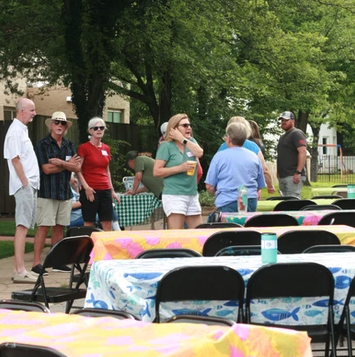8 Reasons to Become a Block Leader (and what it means)
We block leaders are individuals trained by Community Renewal of Pottawatomie County to volunteer in our own neighborhoods to be neighbors who are restoring community through intentional relationships. To fulfill this mission, we pick 5 to 15 neighboring households with whom we build intentional relationships through being visible to them, interacting with them, and gathering them together – also known as BIG.
Being visible means being in front of the 5-15 households often enough and in ways that they can recognize our faces. We might be visible by going for walks, working in our yards, or moving our backyard activities to the front yard.
Interacting with the 5-15 households means verbally interacting with them. We can do this by inviting a neighbor to walk with us, asking a neighbor about their yard, or visiting while we’re in our front yards.
Gathering is inviting or bringing together three or more of the households not including our own. Some examples of gathering could be walking together, hosting a seed swap, or hosting a cookout. If we invite at least three households not including our own to gather, we still celebrate it as a gathering even if less than three come. Showing up for our neighborhood is a vulnerable experience, and we celebrate our bravery to do so.
While we’ve given some common examples of how block leaders are BIG in their neighborhoods, each Block Leader practices BIG in a way that fits their life and lifestyle. Being BIG in our neighborhoods starts off like any other habit: it feels risky, hard, and sometimes downright silly. We can forget to do it or put it off. But we can testify that – when we persist – intentional, restorative, neighborhood relationships become a part of our daily lives.
Some may resist being organized as block leaders. “I can do that on my own,” they say, “Why do I need to be a part of an organization?”
We organize ourselves as block leaders through Community Renewal of Pottawatomie County for eight reasons:
Reason 1: To Build Relationships.
Relationships come first as block leaders. As block leaders, we are people from many walks of life connected across the community, allowing us to develop our own empathy and connection, combating loneliness that is dividing our country, our communities, and our lives.
Reason 2: To Share Ideas.
To start anything new, there must be a path to get there. As block leaders, we share ideas to help each other get going and keep going.
Reason 3: To Share Resources.
We have more together. Being block leaders allows us to share resources, so none of us go without being who we need to be for our neighbors and for ourselves.
Reason 4: To Share Responsibility.
Neighboring, especially hosting larger gatherings like block parties, can be a lot. As block leaders, we can share one another’s loads, so we can get the job done and have fun doing it.
Reason 5: Support Each Other.
We will not love our neighbors perfectly. As block leaders, we support each other through empathy, encouragement, brainstorming, celebration, and reminders to have fun!
Reason 6: Accountability.
It’s easy for life to get away from us. As block leaders, we are accountable to each other and to our block leader commitment.
Reason 7: Paint the Bigger Picture.
It’s hard to see the bigger picture when we’re neighboring on our own. As block leaders, we play a part in painting the bigger picture of who our community’s becoming. We help see this picture form by submitting the monthly Block Leader Survey, submitting the Annual Neighborhood Survey, and by sharing the Annual Neighborhood Survey with our neighbors and friends.
Reason 8: It's fun!
In her book The Gifts of Imperfection, researcher Brene Brown identifies 10 guideposts to being a wholehearted person. “Cultivating Play and Rest” is number seven. Both play and rest are physical needs, just like relationships, that combat depression and other mental illnesses. We agree that this world could use a little more play, and we are pleased to help facilitate that in our neighborhoods.
We believe that, because of these reasons, anyone seeking intentional relationships in their neighborhoods are capable of joining us in this work. None of us are perfect people: much the opposite. We celebrate our humanity with its weaknesses and flaws. It guides us towards engaging with other people so that we may be stronger together.

